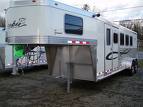There are many things that you should think about before hauling horses. Safety is the most important factor. To achieve this, here are some things that should be considered:
1. The truck engine must be large enough with the proper gear ratio to provide adequate power and pulling ability 
2. Make sure that you know the weight that you are allowed and rated to haul
3. A properly maintained and well-adjusted braking system
4. An electrical system that provides not only trailer lights as well as electric trailer brakes
5. Trailer hitches (whatever type) are well attached, bolted and welded to the frame
6. Safety chains should be used at all times
7. Proper ventilation in trailer is maintained by overhead, side and rear vents air quality and air movement is important
~ Even in cold weather horses need ventilation. Chances are much greater of overheating in the summer than getting cold in winter, from improper ventilation.
There are many different types of trailers, most have many good aspects and many have things that need design changes. The most important thing here is which type of trailer will be less stressful on the Barefoot horse. Many feel that with the slant type horses seem to ride more easily, more stable on starts and stops and less trailering stress. Horses also like to see what is happening as well as other horses. The traditional stock type trailers are still an effective and safe way to transport horses. Horses can be tied head to tail, head to head, and even on the slant sides of the trailer. The key to avoid injuries to the horse is to limit the number of horses on the trailer and not to over crowd. Another good idea is to use Easy Boots for Horses! The Old Mac’s Horse Boots or the Easyboot Glove would be a good choice!

A rule of thumb is to provide a trailer that is 10 inches taller than the normal resting position of the head of the horse. The trailer width should provide enough space to permit 3 inches of lateral movement on each side of the horse. A trailer that provides a 30-inch width may be fine for an Arabian, but might be much to narrow for a heavy muscled quarter Horse. Here are some other features of a trailer that should be considered:
1. Proper tire inflation
2. Floor strength
3. Rubber mats placed over wood floors to provide extra cushion and footing (these should be removed from time to time to permit the urine damp wood to dry)
4. A butt bar provides horses something to brace against rather than the back door of the trailer. This bar is also a safety mechanism in case the door comes open or was not properly fastened.
5. Well padded trailers will help prevent injury or any horse hoof problems in case of sudden stops or accident
6. A well stocked first aid kit and leg wraps
It is recommended that horses are tied with a quick release knot or easy release snaps permanently fixed tie lines in the trailer. A head bumper should be used for those horses that fight the trailer (can help prevent injury to the head) and tail wraps to protect horses that ride the butt bar. Leg Wraps should be used and extend from the hock downward, including the coronary band. Horses that paw or kick the trailer or climb the sides may need knee & hock pads and/or protective horse boots. If traveling for more than 18 hours, horses should be unloaded, exercised and allowed time to eat & drink. (Use extreme caution unloading in unknown areas).
When traveling long distances, water should be watered every 3-4 hours. Maintaining water consumption may prevent impaction and colic. Additives such as lemonade or sports drink can be used to mask any changes in water before and during the trip. Limiting or not feeding grain while feeding free choice hay to horses in transit can make for a good trailering experience. If using a hay net, make sure the net is tied high and tight to prevent getting caught up in feet and legs.
The last thing to remind you of is one of the most important. When traveling with your horse, make sure you are aware of the health requirements for interstate and out of state trips. Proof of Coggins with current health certificate is pretty universal. To find out the different state requirements call 1-800-545-8732 or Click here for the website. In NC you can also call the State Vets office at 919-733-7601.
For more information on EasyCare horse boots and accessories, like hoof pads, be sure to check out our website!
Posted by Chris Freeman




